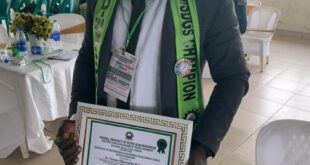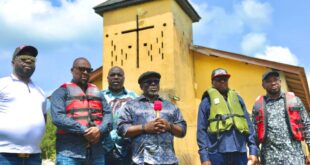By Joseph Onajevwe,
One of the most popular but controversial trending stories on social media today is the quest by a section of Urhobo people to get the name of some parts of the oil city of Warri changed to another to reflect the identity of the majority tribe in the area, the Urhobos of Warri. The name Warri had been synonymous with controversy since 1952 when Obafemi Awolowo punished Urhobo for not voting for his Action Group and for supporting the Zik of Africa, Nnamdi Azikiwe of NCNC in the elections of that period. To reward the Itsekiri people who voted overwhelmingly for Awolowo of the Western region, the title of the Olu of Itsekiri was changed to Olu of Warri and since then, peace had eluded Warri.
That singular act by Obafemi Awolowo had pitted the Urhobos against Itsekiri in an unending war of attrition and sometimes open confrontation with loss of lives and property recorded on both sides. One intriguing aspect of the saga is the ease with which the Itsekiri people through their well-funded propaganda wheel had defended the change of the Olu title and presenting the matter as if the Olu of Itsekiri was an error for over 300 years.
Those advocating for a change in name for some parts of the city of Warri to Wado City have very solid and compelling arguments. Over the years, Itsekiri had lived on bare-faced lies, labouring so hard to present an erroneous picture to the outside world, a picture of ownership of Warri by them yet in the actual sense of the word, they can only lay claim to the fringe of the oil city. There is no controversy of Urhobo ownership of over 70% of Warri metropolis yet Itsekiri’s obsession with domination and pseudo-apartheid tendency of minority rule over the majority will not permit them to accept the truth.
Since the creation of Warri South Local Government Area, Itsekiri had taken it upon themselves to lord it over the rest of Urhobo and Ijaws in that council area. The Colonial administrative arrangement of the time favoured the Itsekiri irrespective of the demographic advantage of Urhobos in the area. Itsekiri decided to hold on to their advantageous position to lord it over the majority Urhobo. The colonial masters thought that in lumping Itsekiri and Urhobo together in one administrative unit because they are so inter-mixed in a relationship, they could fuse into one people in the years ahead. But that was not to be because of Itsekiri who saw Urhobo as an existential threat because of their size and so held on to their advantageous position of gaining initial access to the colonial masters to grab the administrative head of the territory. That was what threw up Chief Dore Numa, who was foisted on the Urhobo, Ijaw and Itsekiri territories as head of the Native Authority of Indirect rule of the period. This prepared the ground for the inter-ethnic tensions and rivalries that trailed the colonial rule of the pre-independence and even post-independence eras till date.
One thing is clear, the term Warri does not have any meaning in Urhobo or Itsekiri. Itsekiri had laboured endlessly to lay claim to the name as derivative from Iwerre. The traditional headquarters of the Itsekiri nation is Ode Itsekiri in the deep bowel of the water-logged rain forest of the Niger Delta. Whatever argument Itsekiri are holding on to in their quest to extend their domination to Warri metropolis is mere political gimmicks designed by Itsekiri historical apologists who promoted Ode-Itsekiri as Big Warri while the main Warri metropolis, in their arguments, as part of their territory. One wonders why their big Warri is not even up to a street in ‘small Warri’, the Warri that the whole world knows.
That Itsekiri is a troublesome, land-grabbing and power-drunk set of people is not in doubt. Just because a handful of them reside in Sapele, they did everything to grab Sapele from Urhobo until the UPU led by Mukoro Mowoe took the matter up in Court up to the West Africa Court of Appeal where Itsekiri finally lost their claim to Sapele. In the case of the main Warri metropolis which is now the subject of discourse with regards to the Wado City Movement, Itsekiri did everything to have a legal title to the land and reduce Urhobo of Warri to their perpetual slaves through a legal battle that went up to the Supreme Court which was eventually won by Urhobo in 1976 as led by the Late Chief Daniel Okumagba. That victory was the subject of the epic and most celebrated musical exploits of Ogute Ottan of Udu.
This writer lives in Warri and finds it intriguing to hear Itsekiri resisting the change of Urhobo areas of the Warri metropolis. As an adult, I am at liberty to change my name to suit whatever prejudices I may subscribe to.
Urhobo owns Warri, that is one fact Itsekiri would rather die than admit. The activities of Dore Numa as head of the Native Authority of the pre-independence era, gave Itsekiri so much advantage as he was empowered to sign many leases and treaties that affected Urhobo and Ijaw land and territories in Warri. What Itsekiri do not want to accept is the fact that those treaties and leases were signed by Numa not as the owner of the land but as head of the Native Authority of the time. It was Dore Numa’s signatures on land leases in Sapele that gave Itsekiri the impetus to contest ownership of the area with Urhobo and they lost. Today, the average Itsekiri man has been so fed with the lies that they own Warri without evidence that they now view Urhobo as aggressors and oppressors who are using their demographic advantage to rob them of what rightly belongs to them. Itsekiris are great propagandists, and taking what rightly belongs to them is not possible. Rather they grab from others with documents which they gather over time, manipulate facts and history and create nothing out of something to grab what is available.
If Urhobo wants to change the name of their territory in Warri, let the music play on. My only concern is that Urhobo has succeeded in marketing the Warri name to the outside world over the years. It will take another lifetime for Wado to gain prominence and for the world to understand why Warri have to retreat for Wado to blossom. If our sons and daughters in the entertainment industry are engaged early to help market Wado as the new name of Warri, in no time, the message will get across the right places. Urhobo must deploy conventional and unconventional means to market the new name and create huge capital from the name change. Itsekiri cannot stop Urhobo from changing the name of their territory. When they change the name of their Olu from Olu of Itsekiri to Olu of Warri, there were tremors but heaven did not fall. To that extend I will support the change of the name Warri to Wado. That way, any visitor to Warri will go home with the right impression that indeed, the place hitherto called Warri truly belongs to Urhobo.
But whatever the proponents of the idea desire to do, they must carry the owners of the land along. You cannot shave a man’s head in his absence. The people of Okere-Urhobo, Agbarha, Ogunu and other parts of Warri Metropolis must, as a matter of necessity be brought into the picture, properly educated and carried along in the quest for any name change, otherwise, we may just be beating the air for nothing.
…Joseph Onajevwe writes from Ginuwa Road, Warri.
Subscribe to the Advocate News letter and receive news updates daily in your inbox.
 Advocate.ng Latest news update on politics, entertainment, sport and more
Advocate.ng Latest news update on politics, entertainment, sport and more



